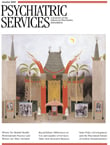Approach to the Psychiatric Patient: Case-Based Essays
In a world of limited resources, imagine having access to case consultation with any of over 100 faculty at Columbia and Cornell at a moment's notice. As a clinician who has spent time in the trenches of community psychiatry, to me such access would be invaluable. Approach to the Psychiatric Patient, an extensive collection of case-based essays edited by John W. Barnhill, M.D., chief of consultation-liaison at New York Presbyterian Hospital and faculty at Weill Cornell Medical College and Columbia University Center for Psychoanalytic Training and Research, opens the door to a corridor rich with resource.
Another important achievement of this collection is that it approximates a historical snapshot of the field. Each short essay is written from a well-defined angle. The authors write as if they had been asked an important clinical question by a colleague, creating tones of familiarity, urgency, and realism. The essays address one of ten composite cases that were well thought out and capture real-world problems. Each case is then addressed by about ten clinical points of view, including many familiar and respected names (Auchinloss, Mann, and Cooper, to name a few), and each section ends with a helpful list of the summary points.
Approach to the Psychiatric Patient provides an educational resource that is valuable not only to trainees but also to seasoned clinicians in any of our disciplines. This book is filled with wisdom and insight. Some are classic, such as Kernberg on borderline organization and Schafer on therapeutic zeal. Some are cutting edge, with views from pharmacogenomics and neuroimaging. Others speak of social context, such as Kim Hopper's essay on a composite case of schizophrenia from a viewpoint titled Homelessness and Social History:
"Psychiatry may make its own history, but it does not do so under circumstances of its own choosing. This hoary homespun truth becomes especially vivid in the lives of its protagonists—patients and providers alike—when they span periods of unusually disruptive change. Such is the case with Anthony Da Piazza: born in the era of secure confinement, suffering his first psychiatric crisis during the heyday of deinstitutionalization, and then settling into an extended period of residential and clinical instability (punctuated by bouts of outright homelessness) during a time when the mental health system itself was struggling to find its bearings, recoup public confidence, and establish a fresh set of ground rules."
With such a distinguished and extensive group of essayists who gave generously to this project, one would hope that the editor rose to the moment. What a task: to coordinate over 100 points of view, to minimize redundancy and inconsistencies, and to maintain flow. In this Dr. Barnhill has succeeded masterfully through his vision for the work and the architecture he used. One might argue a few points—that the breadth of views comes at the expense of some depth, that there may be some institutional bias that could misrepresent the entirety of the field, that the sheer size of the work presents a challenge. These are minor. In the end this book is a gift—to trainees and the academic community, to multidisciplinary teams in the trenches who need practical wisdom, to historians of the future looking for a snapshot of our field at the beginning of this millennium, and (as the dedication indicates) "to the people who suffer from psychiatric illness, with the hope that the text helps improve their care."
The reviewer reports no competing interests.



